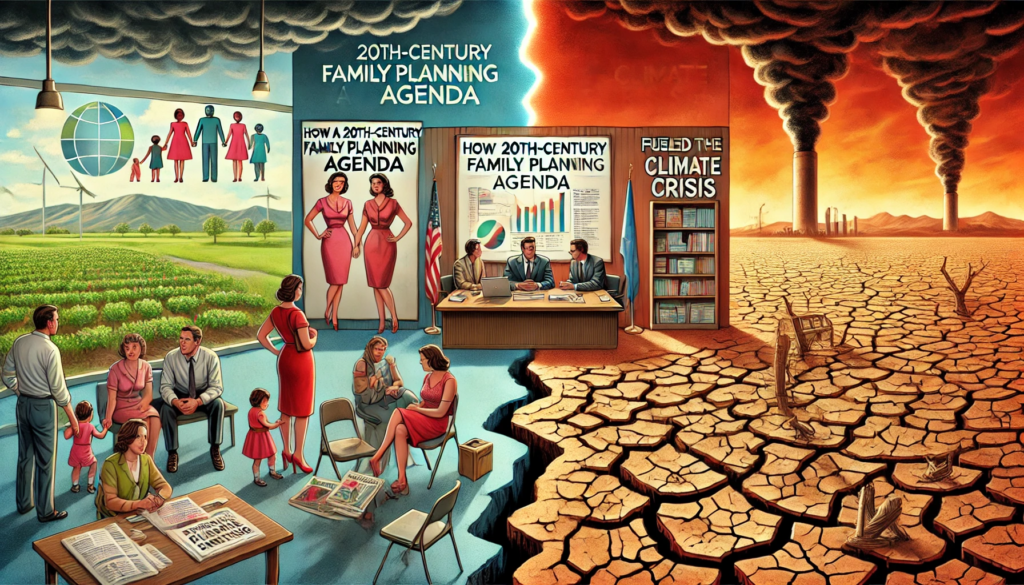In 1948, the Universal Declaration of Human Rights (UDHR) was signed, marking a milestone in human rights history. It established the fundamental rights to be universally protected, with Article 1 proclaiming: “All human beings are born free and equal in dignity and rights.” In the following decades, however, specific events and policies revealed a critical oversight when connecting those human rights to environmental sustainability.

One pivotal moment came in 1968 when the United Nations held its International Conference on Human Rights in Tehran. At the time, private organizations, notably the International Planned Parenthood Federation (IPPF), pushed for population growth to be included on the conference agenda, emphasizing the negative impact of unchecked population growth on human rights.
Yet, when it came time to draft the UDHR, the document never addressed limits to the right to “found a family” or the implications of population growth. This oversight within Resolution XVIII on the Human Rights Aspects of Family Planning, represented a missed opportunity to integrate family planning with child rights and welfare systems. This omission would hold grave consequences for the encroaching climate crisis to come.
Then, in 1990, the UN held its Convention on the Rights of the Child, which stressed the need for special safeguards for children before and after birth. While this would have been a chance to address the gaps in its policies, the UN failed to connect family planning with the idea of children’s rights, which, in turn, ensured population growth would continue unchecked, driving ecological overshoot and exacerbating global inequity.
The Link Between Population Growth and the Climate
The climate crisis—characterized by the excessive extraction of natural resources and greenhouse gas emissions—stems from policies that ignored the necessity of equitable and sustainable population growth.
A 2023 white paper by IAMECON, an economic and social science think tank, highlights this fact. The paper shows the potential carbon savings had nations adopted recommended family planning strategies at critical moments, such as Tehran in 1968 or the International Conference on Population and Development in Cairo in 1994. It also notes how non-coercive methods, such as empowering women and girls, can potentially lower fertility rates, significantly reducing greenhouse gas emissions—highlighting the importance of integrating reproductive rights with environmental sustainability.
Cambridge University economist Sir Partha Dasgupta further underscores this connection, showing that humanity’s environmental predicament stems from the economic success achieved at the expense of natural capital. He argues that focusing on technological solutions to climate change without addressing overconsumption and population growth is “unlikely to lead to real sustainability.”
For Dasgupta, reproductive rights, as they’re currently framed, undervalue family planning by ignoring the justice and welfare implications of excessive population growth. He argues that “to insist that the rights of individuals and couples to decide freely the number of children they produce trump all competing interests is to minimize the rights of all those (most especially, perhaps, future people) who suffer from the environmental externalities that accompany additions to the population.”
The Growth Agenda
Nobel laureate Steven Chu, who served as the U.S. Secretary of Energy during President Obama’s first term, criticizes the global economy’s reliance on ever-increasing populations, likening it to an unsustainable pyramid or Ponzi scheme. He calls for a shift from growth-centric models to sustainable practices that decouple economic prosperity from resource depletion. In other words, a move away from focusing on GDP as the primary indicator of a country’s success.
The alternative is to continue down the road of climate catastrophe we’re already on. An unpublished UN analysis predicts a 60 percent increase in raw material extraction by 2060, with catastrophic consequences for the climate. The report advocates for prioritizing equity and human well-being over GDP growth and suggests reducing overall demand rather than merely increasing green production.
The Case for Birth Equity and Reparations
Addressing climate change requires fundamentally rethinking how we bring new humans into the world. The climate crisis is rooted in treating future generations as means rather than ends. Society views children as future workers, consumers, and taxpayers, not empowered citizens with a voice in their democracies. Most claims of sustainable, green, and humane activities are misleading, creating a false sense of progress.
To effectively address the climate crisis, we must consider how we bring children into the world, ensuring every child has an equal chance at a healthy and sustainable future. This is why groups like the Fair Start Organization call on the United Nations to honor its obligation to ensure all children are born and raised in conditions consistent with the Children’s Rights Convention, which functionally requires climate restoration via birth equity family planning entitlements.
This process involves baseline compensation, taking wealth from those who imposed environmental costs on others without first ensuring birth equity. The world is in crisis because the wealthy elite never paid the actual costs of their wealth, imposing burdens on the environment and current and future generations of humans and all species.
A specific legal process is pending before the United Nations, calling for every child’s right to a fair start in life to be the first and overriding human right. This would authorize climate reparations to future generations, proportionally limiting property rights based on various metrics. Utilizing wealth obtained by ending the fossil fuel industry could fund family planning reforms, ensuring all future children are born and raised in conditions that protect them from future challenges.
The true cost of growth lies in the failure to connect family planning with human rights and environmental sustainability. To mitigate the climate crisis, we must adopt policies that ensure equitable and sustainable population growth, empowering future generations with the freedom and self-determination they deserve.
AUTHOR BIO: Robin Scher is a writer and journalist based in Johannesburg, South Africa. He is a contributor to the Observatory. Follow him on Twitter: @RobScherHimself.
This article was produced by Earth | Food | Life.
